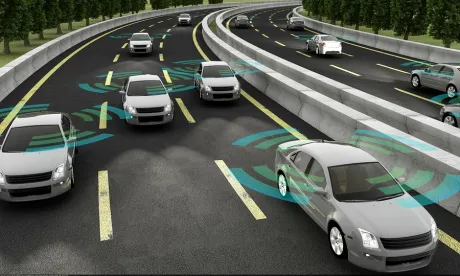In the last thirty years, the retail industry has undergone a metamorphosis brought on by the many new ways we pay for goods - and the related disclosures, agreements, and transaction fees that come as a result.
 It’s not a stretch to think we will soon be able to pay with our cars. eToll, a system installed in rental vehicles to electronically pay tolls, has already been the subject of litigation in New Jersey and we predict many more AutoPay-related patent, antitrust, and liability suits may follow.
It’s not a stretch to think we will soon be able to pay with our cars. eToll, a system installed in rental vehicles to electronically pay tolls, has already been the subject of litigation in New Jersey and we predict many more AutoPay-related patent, antitrust, and liability suits may follow.
The eToll System
In Mendez v. Avis Budget Group, the plaintiff rented a vehicle from Avis that was equipped with the eToll system, an ingenious piece of technology. The system automatically pays the toll for the driver when the vehicle passes through the toll. Convenient, right? But, there’s a price for convenience. Just like there’s a “convenience fee” to simply swipe a card rather than counting out bills and coins, Avis charged an additional fee to simply drive your car through the booth to pay. No stopping the car, rolling down the window, or counting out dirty change. What would you pay for that convenience? According to Avis, $15.00. According to the plaintiff, Avis’ contract disclosure wasn’t clear enough, hence the lawsuit and the dueling experts.
What type of expert would you bring in to show the disclosure, explanation, and consent to certain transaction fees was sufficient? Both Avis and the plaintiff brought in their own marketing experts to opine. On the plaintiff’s side, the expert opined that the counter pamphlets and website disclosures of the eToll system were not sufficient and did not adequately inform the customer the program was optional. Not surprisingly, the defendant’s expert reached the opposite conclusion. Coincidentally, just as financial transactions are becoming more electronic, so are contractual agreements. Some of the eToll disclosures were on Avis’s website. Part of the Daubert attack by Avis on the plaintiff’s marketing expert was that she focused on certain parts of the website where the disclosure was weak and ignored other sections where the defense claimed it was strong. The question to the judge was whether that focus made her opinion inadmissible. What do you think?
Think About It
Would her focus on certain parts of the website go to the weight as opposed to the admissibility? If that was your answer, you’d be right according to the District Court of New Jersey. While the plaintiff’s expert did concede she had reviewed more evidence than what was highlighted in her report, the judge explained she is not required to review all of it for her opinion to be admitted. Now, might this prove to be a perfect plan of attack on the reliability of her opinion at trial? Perhaps, but that’s exactly where that attack should occur, at trial.
What we found truly interesting about this opinion was the subject matter and the field of expertise involved. This is not the first time eToll transaction fees have been the target of a legal battle. In Florida, the Attorney General recently announced an out-of-court settlement with Avis and Budget over similar claims. Is it possible there’s a larger trend here? Imagine the many types of financial transactions that can—in today’s almost astonishingly electronically-controlled world—be managed through some device in your car. Pay for a latte by driving past a magnetic strip in the drive-thru lane. Have gas automatically pumped and paid for by pulling onto the designated fueling pad. Pay your parking fee by driving through the garage exit. Tolls would never slow traffic again. All charges would be electronically processed at the speed of traffic, by a single electronic receiver.
Now, imagine the many patents that will come into play with this new technology: laser, photographic, or Bluetooth receivers; software to calculate and attribute each charge (and perhaps the vendor-specific transaction fee); and security encryption programs to make sure your financial information isn’t hacked.
Conclusion
There might also be suits like this one regarding the convenience fees charged, and whether they were adequately disclosed and proper consent was obtained. Envision allowing consumer purchases at the speed of traffic and the highly-skilled experts—in chip readers, magnetic strip detection, accounting software, vehicle data storage, cloud encryption, automotive financial data security, electronic banking, and marketing – to opine on the adequacy of transaction fee disclosures.




 />i
/>i

